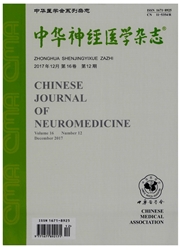

 中文摘要:
中文摘要:
目的检测颅内动脉瘤组织中的免疫和炎症相关差异表达基因,探讨其在颅内动脉瘤发病机制中的作用。方法利用Affymetrix公司的人类基因组基因芯片U133A分别检测3例颅内动脉瘤组织和3例正常颅内动脉组织中的基因表达谱,用生物信息学软件进行比较分析,对差异表达基因进行功能分类.对其中的免疫和炎症相关基因进行分析。结果与正常颅内动脉组织相比,在所检测的总共22215个基因中,颅内动脉瘤组织中差异表达水平达10倍以上的基因中.有40个基因与免疫和炎症有关,其中38个基闪的表达水平在颅内动脉瘤中上调10倍以上,2个基因表达水平下调10倍以上。结论免疫和炎症相关基因的异常表达可能参与了颅内动脉瘤的形成和发展。
 英文摘要:
英文摘要:
Objective To examine the differentially expressed genes related with immunity and inflammation in intracranial aneurysm, and to analysis the role of these genes in the pathogenesis of intracranial aneurysm. Methods The tissuses from 3 intracranial aneurysm removed during the operation and 3 normal intracranial arteries from 3 normal adults were collected, the eDNA were retrotranscribed from the extracted RNA and the biotin-labeled cRNA derived from the transcription of eDNA were fragmented as probes, respectively. Then, the probes were hybridized with Affymetrix Human Genome U133A Array. GeneArray Scanner was used to screen the signals of hybridization and Microarray Suite software 5.0 was applied to analysis the expression of genes. The immunity- and inflammation-related genes were analysized. Results Among the total 22 215 genes examined, 40 ones related with immunity and inflammation expressed differently in intracranial aneurysms compared with normal intracranial artery. Among them, 38 genes were showed upregulated more than ten times and 2 genes downregulated more than ten times in intracranial aneurysm. Conclusion Genes which are related with immunity and inflammation and differently express in intracranial aneurysm may be involved in the pathogenesis of intracranial aneurysm.
 同期刊论文项目
同期刊论文项目
 同项目期刊论文
同项目期刊论文
 期刊信息
期刊信息
